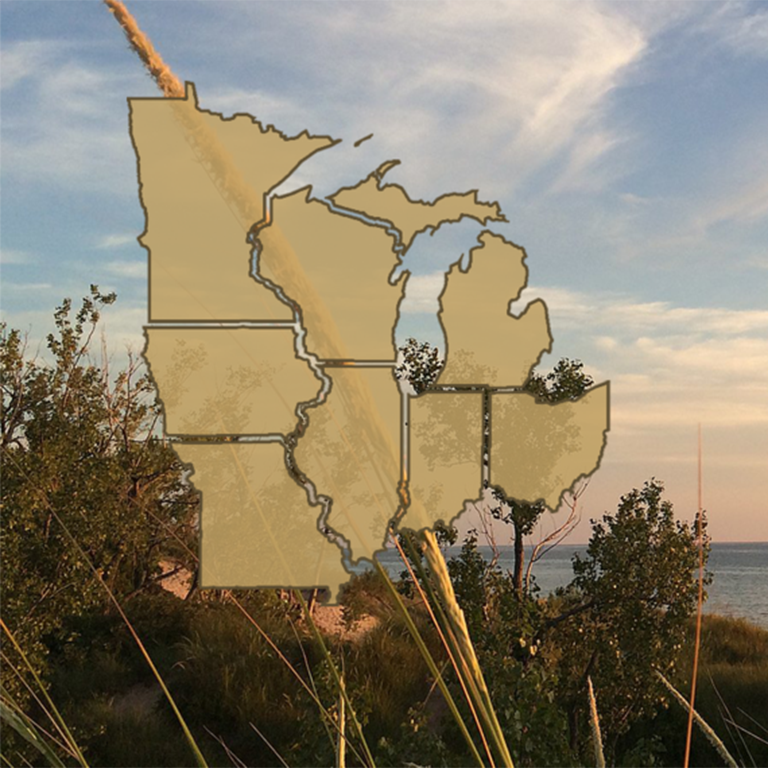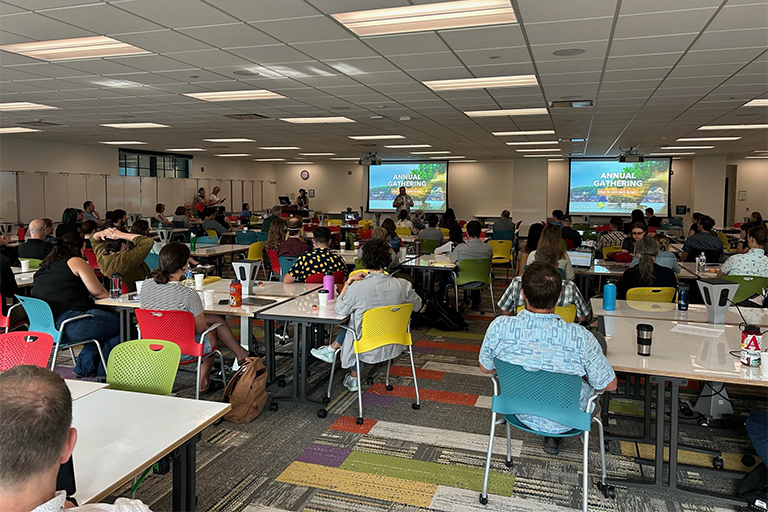The impacts of climate change in the Midwest look different than other regions of the country. So do its solutions.
That’s why Indiana University became a founding member of the Midwest Climate Adaptation Science Center (MW CASC) in 2021 alongside a consortium of eight universities and natural resource organizations. Through dozens of funded research projects, the U.S. Geological Survey-funded center focuses on climate issues that affect water, land, people, and wildlife in the region.
In August, researchers affiliated with IU’s Environmental Resilience Institute (ERI) attended MW CASC’s annual gathering to learn and share knowledge with other consortium members. The IU delegation included ERI Executive Director Gabe Filippelli and O’Neill School of Public and Environmental Affairs Professor Kim Novick—both members of the Midwest CASC leadership team—as well as Richard Phillips, a biology professor in the College of Arts and Sciences, and biology PhD candidate Nicole Spanier, an MW CASC graduate fellow.
Hosted by Michigan State on its East Lansing, Mich. campus, the three-day event showcased the challenges and opportunities of climate adaptation at the interface of land and water, such as the coastlines of the Great Lakes. Sessions focused on climate-informed restoration, maladaptation, partnership building, and innovation in adaptation.
“One of the goals of the Midwest CASC is to be involved in actionable science and to show how climate science research can inform environmental policy,” said Filippelli. “It was great to see the breadth of research presented at this event that’s specifically tailored to the needs and challenges of Midwest states like Indiana.”
As part of the gathering, researchers presented lightning talks and posters on dozens of adaptation research projects. Among the presenters was Spanier, who said the event opened her eyes to how her research might be applied beyond academic settings.
Spanier spoke to attendees about her study of tree resilience and drought in the face of climate change, research she conducted under the guidance of Philips, her faculty advisor. With wider swings in precipitation predicted as an effect of climate change, Spanier conducted experiments on trees’ ability to withstand drought amidst microbial communities adapted to varying levels of soil moisture.
“Our research shows that soil microbes that had experienced drought conditions can actually contribute to higher rates of tree photosynthesis during a drought,” she said. “This indicates a pathway for trees to adapt to periods of dry conditions in a future climate.”
In addition to Western scientific approaches, the MW CASC event also celebrated Indigenous approaches to understanding and addressing the climate crisis.
Now entering its fourth year, MW CASC presents unique opportunities for IU researchers to contribute to the Midwest’s resilience, with a call for science proposals issued each spring. Past projects involving IU researchers have focused on shifting winter precipitation trends in the Great Lakes Basin and the effects of lead contamination on avian health.
Currently, Filippelli is launching a project to understand how urban areas influence species’ abilities to adapt to a changing climate change. He is also contributing to a climate adaptation postdoctoral fellows program run by USGS’s national CASC, with projects focused on ecosystem contraction, forestry, predator/prey dynamics, and more.
“There are so many opportunities for impactful research being generated by this consortium,” Filippelli said.
About the Environmental Resilience Institute
Indiana University’s Environmental Resilience Institute connects a broad coalition of government, business, nonprofit, and community leaders to help Indiana and the Midwest better prepare for the challenges of environmental change. Together, we integrate research, education, and community to create environmental resilience and climate solutions—building a more sustainable, equitable, and prosperous future. Learn more at eri.iu.edu.






